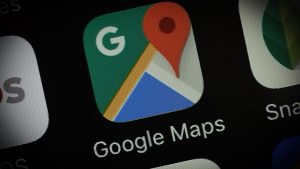We give up a lot of privacy when we use google maps. You should be aware of what exactly is being shared so you can make an informed opinion on whether or not this is more information than you feel comfortable sharing.

Knowing where you are is a big benefit for the overall community. – eg if you’re in traffic and it’s taking you longer to go from stop light to stop light, google will recognize this in maps and will re-route other people who are looking to take that route. This is a very good thing.
If you didn’t already know, your google account is universal – it’s the same account on your phone as on your laptop.
Go into google maps and on the left drop down menu choose “Your Timeline”. Check out the detail of information that google is capturing and storing for you. It shows your entire day laid out in google maps and also what TIME – what time you leave and arrive.
It also stores the PHOTOS you took at those locations.
This is the sort of data that google maps is storing.
Google Earth can track your location using your phone’s GPS chip or your IP address when browsing from a desktop. However, unlike Google Maps, it doesn’t keep the record of the places you visit. Also, the location bookmarks you add to the My Places section are saved on the device itself. These can be exported as KMZ or KML files.
To erase certain history – on the location spot you can click to erase that stop from the day. It will no longer be part of your day. This is the granular amount of control you have on google maps.
You can also erase ALL your information.
On your phone: Go into your Settings, Location Services, then turn off location services. But now you won’t have the same benefits of google maps.
This is the tradeoff – you have to give up some of your privacy for the benefit of convenience/entertainment/profit.
You can determine app by app whether you want that app to have access to your location. Go into Location services on your phone and pick and choose from here.
Retrieved from: https://www.youtube.com/watch?v=pVP8UYHprc8
Google maps’ role in the creation and erasure of international borders
As a political science major, this was a fascinating movie to watch in terms of seeing the impact that google maps is having on creating and erasing international borders. Oftentimes, it will depend on your location in the world to see what international borders define geography.
Take the northern region of India of Himachal Pradesh for example; if you reside in China this region will show as part of China. If you reside in India it will be part of India. Anywhere else in the world it will be a dotted line around this area to show that this area is contested.
Lesson/Project Ideas
- Points of interest map
- Student commentary
- Family heritage map
- Map languages
- Class info
- Fictional settings
- Trip planning – real or imaginary
Google Street View
- Not just streets
- Cultural, political, physical geography
- Google cultural Institute
- Museums, natural wonders, architecture,
- Art, curricular content, historical documents, deep dives
Google Earth vs. Google Maps- What’s the difference?
Google Maps is for routing and getting to places (utility over experience)
- Small hint of satellite imagery
- Contains navigation, lightweight mapping power, and points of interest
- The point: find places to go and get there (by car, bike, bus, or foot)
- Drawback: Doesn’t really give you a feel of where you’re going (there is street view, but zooming out only gives you 2D, low-res satellite imagery)
Google Earth is for exploring (experience over utility)
- Complete 3D satellite data
- Small subset of information on places, without any point-to-point navigation
- The point: visit places in high res 3D, really get to look around and see what things are like
- Drawback: lacks the rich data experience offered by Maps
Cool Things To Do on Google Earth (and beyond)
- Find Your House (and get up close with Street View)
- Flight Simulator
- View the Past
- View Layers
- “I’m Feeling Lucky”
- Google Moon, Mars, and Sky
- Voyageur
Lesson/Project Ideas
- 20 Questions
- Engage in real-world math activities/experiences
- Explore different environments
- Create Your Own KML Tour
- Scavenger Hunt